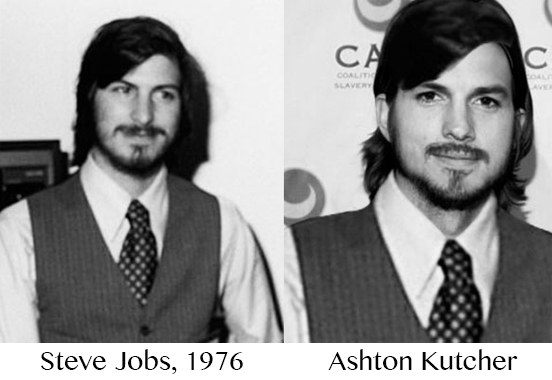Say you’ve created a guaranteed controversial movie: A biopic about one of the most beloved innovators of all time, starring the protagonist of “Dude, Where’s my Car”. Steve Jobs’ longtime business partner Steve Wozniak, a.k.a. the Great and Powerful Woz, has already come out to trash your film and bad press is almost guaranteed, but you need to get audiences in the theaters. What are you going to do?
The managers behind The Jobs Movie’s social pages know what their doing. They’ve created a brilliant system to give their movie authenticity while simultaneously minimizing criticism. As for their managers, however, there are signs that they aren’t putting ample resources into powering the social media system. How do we know?
Every post on the film’s social properties is a master of craftsmanship. You can easily tell because of how positive the whole page is. The social media masterminds behind the page have realized they can never win the debate of whether Ashton Kutcher can play Jobs. But rather than pretend that question doesn’t exist, they release information that simply makes the debate appear insignificant while simultaneously winning it. Take this photo of Jobs and Kutcher for example. Can you tell which half is the actor and which is the real Steve? Exactly.
 You can see mastery in how they’ve designed their posts as well. They don’t respond to Woz’s comments, but instead post another opinion by a close friend of Steve Jobs from the far more prestigious Salon Magazine. Again, they don’t ignore the question, “Can this movie portray Steve Jobs accurately”. Instead, they simultaneously refuse to acknowledge that the answer could ever be no, while offering irrefutable evidence for why the answer is yes.
You can see mastery in how they’ve designed their posts as well. They don’t respond to Woz’s comments, but instead post another opinion by a close friend of Steve Jobs from the far more prestigious Salon Magazine. Again, they don’t ignore the question, “Can this movie portray Steve Jobs accurately”. Instead, they simultaneously refuse to acknowledge that the answer could ever be no, while offering irrefutable evidence for why the answer is yes.
Yet it’s clear that the film directors are not quite sure what they are doing on the web. Don’t get us wrong, their online properties are all well designed (the website is fantastic), but they are not branded well. First off, there is an incredible amount of confusion over the name of the movie. We found the film listed online as both Jobs and iJOBS, though neither of these names return you to “The Jobs Movie” when you Google them. SEO is hardly a new science, so this should never have happened. For comparison, go to Google and type in “Lincoln.” The second recommended search displayed is “Lincoln Movie” and Lincoln’s IMDB page is the second page result listed. Now that’s good SEO and good branding.
And while we’re on the subject, good luck finding this movie on Twitter, or run a Facebook search for anything that isn’t exactly “The Jobs Movie”.
The film’s social campaign may also be lacking on the funding it deserves. If you use a Twitter-analyzing tool like Bottlenose’ Sonar, you’ll see that opinions on the film break even, with users tweeting hashtags #woz and #wozwrong to disparage the movie and others using #jobs to praise it. But with a few promoted tweets and a promoted account, this 50/50 split could probably have been avoided. In addition, it’s an embarrassment for a wide-release movie such as this one to have just 2,000 followers at this point in the development cycle. Many viewers will go to the movie based on what their friends are retweeting from that page. Does the marketing team really think they can fill the seats if the total number of interested friends/followers is 2,000?
Ultimately, we can’t tell you whether the advertising blitz that is sure to begin in April as the movie approaches its release date will not rectify these issues. But what we can tell you is it’s never too late to start branding yourself properly. The managers of the Jobs’ Facebook and Twitter pages clearly understand this. Their bosses may not.


